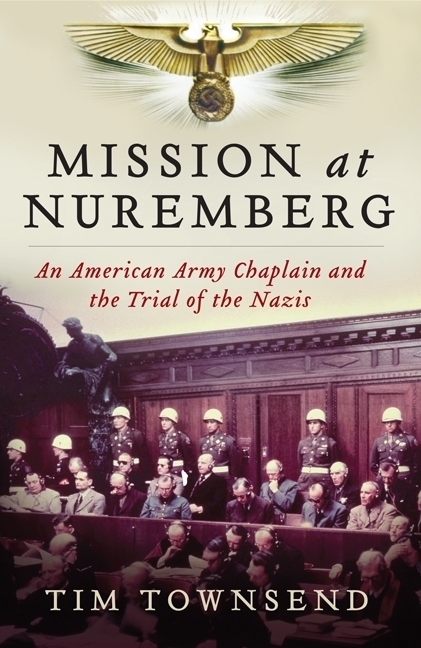
Tim Townsend
Reviewed by: Greg De Jong
Mission at Nuremberg: An American Army Chaplain and the Trial of the Nazis, by Tim Townsend. William Morrow, 2014. Hardback, 400 pages, list price $28.99. Reviewed by OP ruling elder Greg De Jong.
"Could God save Hitler?" Such a question has launched many youth group discussions over the years. After a rousing debate, everyone can return to real life.
But Mission at Nuremberg allows no such safe retreat, as we witness the real-life collision between God's amazing grace and some of the worst moral monsters of the twentieth century. Author Tim Townsend provides a riveting account of Lutheran minister and Army chaplain Henry Gerecke's work as spiritual counselor to fifteen senior Nazi leaders during their imprisonment and trial in 1946 for war crimes following the collapse of the Third Reich.
Although Townsend writes in an engaging style, the result is anything but light reading. The author presents troubling accounts of concentration camp atrocities that leave little doubt that Gerecke's spiritual charges, including Hermann Goering, Albert Speer, and Rudolph Hess, were architects of a system so heinous and depraved that they deserve only revulsion.
Chaplain Gerecke concludes otherwise. Townsend opens with Romans 12:21, "Do not be overcome by evil, but overcome evil with good." He proceeds to illustrate how Gerecke, despite intimate knowledge of the Nazis' crimes, doggedly pursued them with the claims of the gospel.
There is much to admire in Henry Gerecke. His passion for the lost was tempered by strong convictions on the nature of true repentance and saving faith. When Hitler's labor chief, Fritz Sauckel, readily agreed to attend chapel and asked how he could prepare himself to receive the Lord's Supper, Gerecke agreed only to catechize him. Then Townsend treats us to this amazing prison scene:
Each time the chaplain visited, the two men ended their time together in prayer, kneeling on the floor by the cot. Many times, Sauckel asked for God's mercy and wiped away tears as he called himself a sinner.… Eventually, after one Sunday church service, Sauckel asked Gerecke if he could take Communion. "All right, Mr. Sauckel," Gerecke told him. "I'll be down to see you." When Gerecke arrived, Sauckel was on his knees praying on the cement floor of his cell.
Gerecke entered the cell and prepared the Communion kit against the wall. Sauckel got off his knees, threw his hands in the air, and cried so loudly that every guard on the floor came rushing to Sauckel's cell. "Gott sei mir gnädig, ein Sünder!" Sauckel yelled. "God, be merciful to me, a sinner!"
Were these merely superficial "foxhole conversions" by men facing likely execution? Gerecke believed otherwise, and if Townsend's recounting is accurate, I fully expect that one day in glory we'll meet not only the thief on the cross, but some Nazis as well.
Two caveats are in order. First, I cannot recommend this book for young readers, due to brief but disturbing accounts of Nazi depravity. Second, although Townsend gives sympathetic treatment to Gerecke and his apparently solid theology, the author's own brief theological digressions are sadly confused. That protest aside, this engaging book will forever alter my view of what it means to reach out to the lost. Highly recommended.
June 15, 2025
June 08, 2025
June 01, 2025
Anxiety: Finding the Better Story
May 25, 2025
April 27, 2025
The Devoted Mind: Seeking God’s Face in a World of Distraction
April 20, 2025
April 13, 2025
© 2025 The Orthodox Presbyterian Church